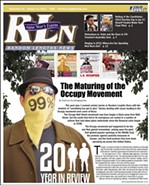Making a Distinction Between 'Terrorists' and 'Insurgents'
For more than two years, the Bush administration -- often echoed by news media -- has portrayed the U.S. occupation of Iraq as part of “the war on terror.” Now, with American public support for the war at low ebb, President Bush and Vice President Cheney are redoubling their efforts to cloak the war in anti-terrorism rhetoric. But those efforts have run into a formidable problem: Rep. John Murtha.
From the standpoint of media spin, the most effective argument for keeping U.S. troops in Iraq is that they're fighting terrorists. That's why Bush and Cheney are so eager to conflate Iraq’s insurgency with terrorism. But on Dec. 7, just after Bush gave a speech that repeatedly depicted the Iraq war as a battle against terrorism, Murtha debunked the claim at a news conference.
“You heard the president talk today about terrorism,” Murtha told reporters. “Every other word was 'terrorism.'” But terrorism, epitomized by the 9/11 attacks and the subsequent bombings in Spain and London, should not be confused with the war issue, Murtha declared: “That’s completely separate from what's going on in Iraq. Iraq is an insurgency.”
With those words, Murtha -- a former Marine and one of the Capitol Hill lawmakers in closest touch with top military leaders at the Pentagon -- confronted the core of the administration’s current argument for keeping American soldiers in Iraq. “Let’s talk about terrorism versus insurgency in Iraq itself,” Murtha said. “We think that foreign fighters are about 7 percent -- might be a little bit more, a little bit less. Very small proportion of the people that are involved in the insurgency are terrorists or how I would interpret them as terrorists.”
Murtha threw cold water on the storyline that presents U.S. troops as defenders of Iraqis. He cited a recent poll, commissioned by Britain’s Ministry of Defense, indicating that four-fifths of Iraqis now want the American and British forces out of their country. “When I said we can’t win a military victory, it's because the Iraqis have turned against us,” Murtha said.
Contrary to what countless pundits still contend, Murtha sees the U.S. presence in Iraq as a boon, not an impediment, to terrorism. “I am convinced, and everything that I’ve read, the conclusion I've reached is there will be less terrorism, there will be less danger to the United States and it'll be less insurgency once we’re out,” he said. “I think the Iraqis themselves will turn against this very small group of Al Qaeda. They keep saying the terrorists are going to control Iraq. No way.” The relatively small number of Al Qaeda forces in Iraq will become isolated when the deeply resented occupiers leave Iraq, he predicted, and actual terrorists will no longer find a haven among most Iraqis.
During his presentation about the importance of distinguishing between terrorism and insurgency, Murtha was directly admonishing the White House. But what he said could also serve as a reality check for news media.
All too often -- without attribution to any source -- reporters have asserted that the U.S. military actions in Iraq are part of “the war on terror.” And journalists have routinely failed to include any perspectives that challenge the view, avidly promoted by the Bush administration, that the fighters doing battle with American forces in Iraq are terrorists.
In a typical news report, airing on “All Things Considered” early this month, NPR correspondent Anne Garrels presented the U.S. government line as the only one worth mentioning. From Baghdad, she described recent American offensives and then told listeners: “The military says its actions have resulted in numerous terrorists killed or detained, as well as the discovery of a large number of weapons caches.”
But were the dead and captured fighters actually “terrorists” -- or were they Iraqis who had been participating in insurgent attacks on forces occupying their country? From the standpoint of good journalism, there's a meaningful difference. The Bush administration may be glad to define a “terrorist” as anyone who uses force against occupation troops. But that is a flagrant manipulation of language.
Journalists are not supposed to participate in twisting words for propaganda effect. Yet too many reporters for American news outlets have allowed their work to slide in that direction. This is one more reason why John Murtha's rebuttal to President Bush's speech on Dec. 7 has rendered a valuable service to the country.
Norman Solomon is the author of the recent book War Made Easy: How Presidents and Pundits Keep Spinning Us to Death.





